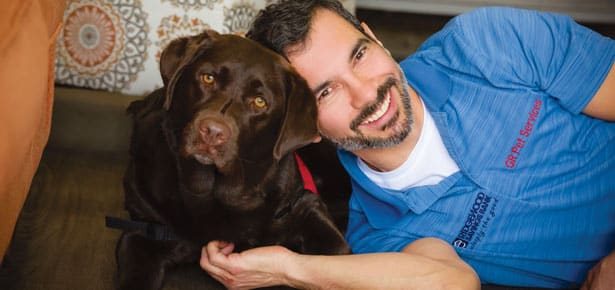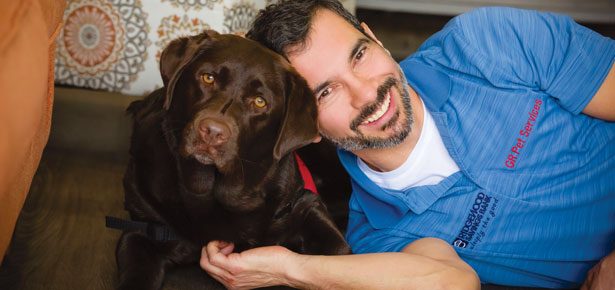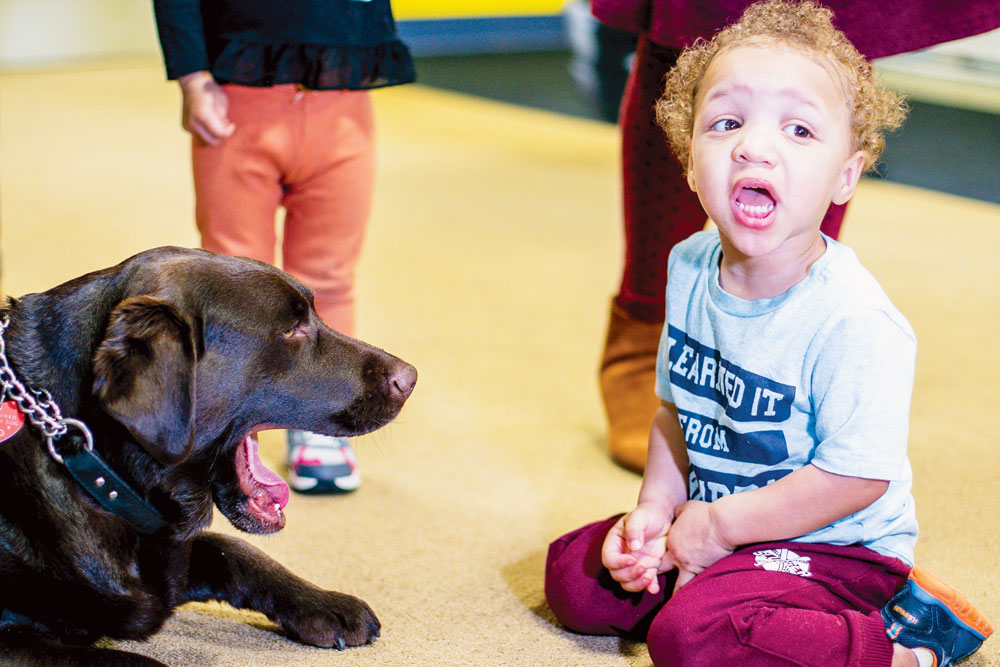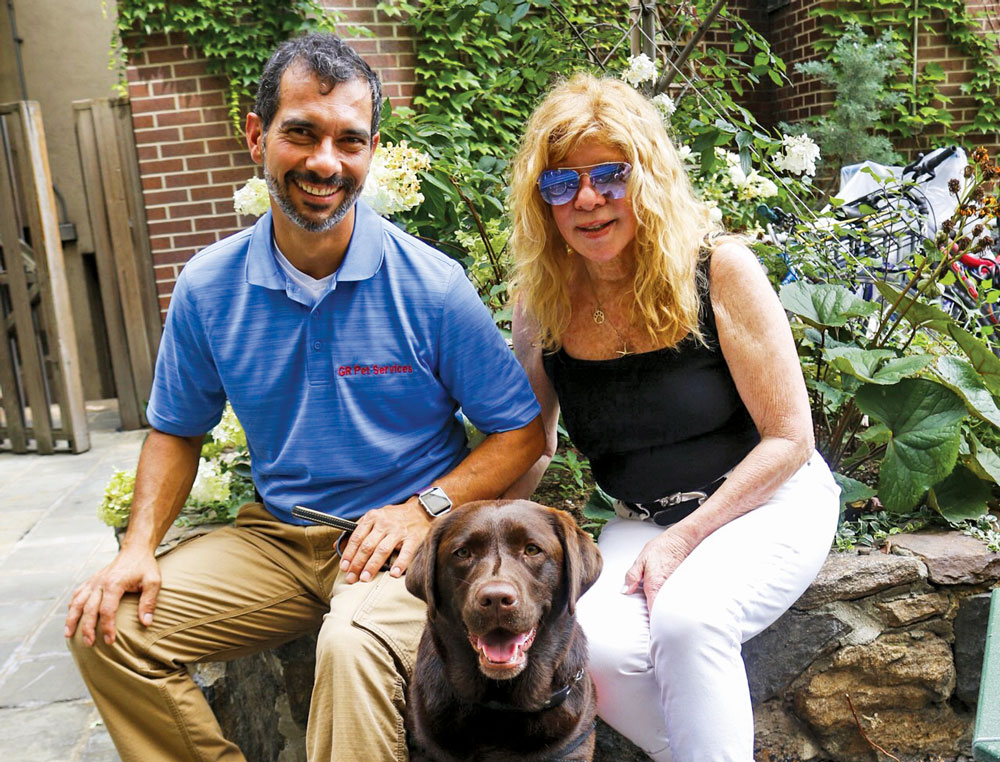

Lesson in Love
A Spanish speaking, four-footed therapy dog brings joy to children in desperate situations
A four-footed, furry therapy dog is giving lessons in love at Covenant House, one of New York’s shelters for homeless youth. Clients are vying for her attention, throwing her a deflated football, taking pictures, or just stroking her soft fur. Everyone wants to know more about the chocolate Lab.
Except the skinny young man slouched over his cellphone, face almost obscured by a baseball cap. The dog’s owner, June Bleich, comes over to greet him. He inclines his head to acknowledge her presence but says nothing. Then the dog’s handler, Guillermo Roa, whom pretty much everyone calls Memo, takes a stab.
“Hey buddy, you want to say hello to Molly?”
He scowls.
Molly isn’t fazed. She tries to lick his face, but Memo reins the dog in. “No, be gentle,” he tells her in Spanish. The dog moves away.
The boy’s head jerks up and his eyes widen with wonder. “Does the dog speak Spanish?” he asks.
“Si,” says Memo.
The morose youth suddenly explodes with questions. “What’s her name?” “How did you teach her to understand Spanish?” “Why is she so nice?” He caresses her luxurious coat and she wags her tail furiously.
The session ends just as they’re becoming acquainted. The young man folds the dog in his arms and kisses her goodbye.
These kinds of “mini breakthroughs” happen regularly during the therapy dog’s visits, says Tom Manning, one of the shelter’s staff. Clients at Covenant House have little reason to trust humans—they’ve been trafficked, abused, or aged out of foster care. “None of the reasons are good—no one wants to be here,” says Tom. On top of everything, society often blames the kids for finding themselves in these desperate circumstances.
But animals don’t judge. “Molly comes for only one reason—to make their lives better,” says Tom. The youngsters enjoy watching her react to commands in two tongues. “It’s a very cool ice breaker.”
As the kids warm up to her, Molly welcomes petting, then rolls over for a belly rub. Her antics and her affection can penetrate the toughest of exteriors. “It’s amazing what can happen,” he says. “Molly is a gift.”
The youth of Covenant House aren’t the only ones touched by Molly’s magnetism. By the time the therapy dog arrived at the shelter, she had already turned around the lives of her owner and her handler.
Den mother: Molly’s owner June Bleich
Molly Jo (known as Molly), was a godsend for her owner, June Bleich, who adopted her in 2016. June’s children had left home years earlier, and she missed having someone to nurture. And while the mother of two had found new purpose volunteering with the American Cancer Society, the high death toll amongst its clients was draining her drive. After losing her beloved dog Hayley, she plunged into a grief so profound that it took her half a year to recover.
When she was ready for a new pet, June called her vet to help her find a chocolate Lab from a noble lineage. Soon she was inspecting a litter of squirming, fuzzy brown puppies. The dog with the cowlick on her nose stood out even then. Though all the other pups peed on shavings, Molly opted for the blanket. June admired her originality. “This dog was special,” she says.
The pair bonded immediately. “I could see from the way she was looking deep into my eyes that she had a talent for communication,” says June. Molly’s ability to engage made her an empathetic companion during bad times. “She senses if something is up—she snuggles so close to me she almost gets under my skin,” says June. The volunteer had always wanted a therapy dog to accompany her on hospital visits, and she quickly realized that Molly was the perfect candidate for the job.
She didn’t need to look for the perfect trainer to mould Molly into a certified therapy animal. Guillermo Roa had been waiting for just such an opportunity.
Dogged determination: Trainer Guillermo “Memo” Roa
The Colombian native was born with an affinity for animals. He could teach tricks to any of the neighbourhood dogs and was able to calm even the most aggressive animals. When their owners plied him for his formula, he didn’t know how to answer. “Animals connect with me—it’s magic,” he says.
As he grew up, Memo yearned to become a vet, but his father steered him to study the more lucrative field of business administration. After joining his relatives’ roofing company, he got married and started a family.
But turf wars of rival drug gangs threatened their security in Colombia. As car bombs shattered the peace, Memo would race to the phone to check up on loved ones. “It was too hard—I didn’t want to live that way,” he says.
After the Roa family immigrated to the US in l999, the 36-year-old father had to reinvent himself. Since he didn’t speak a word of English, he was lucky to be hired as a server. He sweated every time a customer demanded a utensil—if he brought a knife instead of a spoon, they yelled at him. Gradually, he mastered the language and was promoted to work as a butcher.
That’s how he met June Bleich. As he served her steaks, the bubbly blonde native New Yorker and the earnest, upbeat newcomer traded anecdotes about animals. Memo confided his true calling to work with dogs.
With encouragement from his wife, he began an online course to become a certified dog trainer in 2014. After ten-to-twelve hour shifts at the deli, he would come home, gobble up his dinner, and hunker down with a computer and an English-Spanish dictionary.
He had completed the course and opened his own dog training business by the time June arrived with a puppy nestled in her arms.
Memo fell in love with the puppy instantly. “It was like seeing a beautiful girl whom you want to marry,” he says. Picking up the dog, he covered her in kisses. On the spot, June invited him to become Molly’s trainer. From then on, the three would form an inseparable dog therapy team. (Though just Molly and Memo are certified, June attends every one of their sessions.)
Assembling the pack
With Memo as Molly’s teacher, some canine problems like separation anxiety and persistent barking were resolved. His gentle approach, emphasizing communication over castigation, was proving to be effective.
Memo applied the same principles in courting Molly’s friendship. “I don’t want to train a robot—I want a dog to trust me,” he says. On their first day he sat on the floor at her eye level and allowed her to sniff him before he touched her. He offered her a treat, she scarfed it down, and then he took her outside to play tag. By the end of the hourlong lesson they were buddies.
Basic obedience was next. Alone with Molly, the trainer flipped back into his native Spanish as he told her to sit and lie down. “I can express myself easier in my first language,” says Memo. He also taught her the English equivalents. And though it hadn’t been planned, June was thrilled when she found out from her housekeeper that Molly understood Spanish. Many of her clients at the American Cancer Society were unilingual Hispanic and would appreciate a handler and dog who understood them.
Memo and his canine charge developed an effortless chemistry. Once, during lunch, Molly put her paw on Memo’s leg and begged for a morsel. Memo looked at her and whispered, “Excuse me.” Molly backed down. She never interrupted a meal again. (At least not in the trainer’s presence.)
“Her antics and her affection can penetrate the toughest of exteriors. It’s amazing what can happen. Molly is a gift.”
After Memo completed Molly’s basic education, he determined her suitability for service. He took her on a trial run to the nursing home where his wife was working. Molly was a hit. “She was so nice, so calm—everyone loved her,” says Memo.
They started therapy dog training. He exposed her to increasingly scary situations, from roads with rattling bicycles and honking cars, to hospitals with bumpy elevators and zig-zagging wheelchairs. Molly didn’t bat an eye.
Molly reaped an unexpected benefit from this work. Dog owners seeing the duo in action hired Memo to train their own pets as therapy animals. As his reputation spread through word of mouth, his business took off. “Molly helped me reach my dream,” he says.
Molly was ready in just one year to undergo the certification exam with Memo as her designated handler. Over three gruelling days, the duo had to demonstrate control as they faced barking dogs, tempting treats, and noisy hospital hallways. They aced the tests and got the stamp of approval from the Alliance of Therapy Dogs. The newly minted Certified Therapy Dog Team was now eligible for liability insurance, a prerequisite to volunteer at any legitimate organization.
Though June had originally intended to train Molly for the cancer ward, she “had an epiphany” the day she passed a truck bearing the name of the homeless shelter. “Oh my God, why didn’t I think of Covenant House?” she asked herself. Its many Hispanic clients would welcome the bilingual dog and her handler, and she could switch her focus from sick seniors to vital youngsters. “It would be a rebirth.”
Pulling together: the dream team
Molly, Memo, and June have found their place since they began volunteering at Covenant House in 2017.
Molly is gaining recognition—she’s currently a finalist amongst the American Humane Hero Dog Award nominees, in the Therapy Dog Category. (You can vote for Molly here herodogawards.org/dog/molly-jo)
The bilingual dog puts everyone at ease, especially the Hispanic youth, says Memo. The handler has had firsthand experience of the ridicule many endure when struggling to speak English in public. Seeing the dog respond to their mother tongue is restorative. “It opens their hearts,” he says.
Once they’ve established a rapport, Memo starts the party—playing catch with Molly and the kids, demonstrating dog training techniques, and answering a litany of questions about the dog. “Memo is so good with the kids—he gets them laughing,” says Tom.
For his part, Memo gets back as much as he gives. “I’m pleased with myself because I made these people feel safe,” he says.
June too feels fulfilled at Covenant House. Youth gravitate towards her maternal aura and open up to her readily, says Tom.
On one occasion, June coaxed a shy young man to perform a piece he had taught himself to play on a violin donated by the shelter. It wasn’t a brand new, expensive violin like the ones privileged Long Island children practise on—it had clearly been through the mill, says June. But from the delicate way he handled the instrument, it was obvious that he prized the beaten-up violin. As the notes of Amazing Grace tumbled from his bow, Molly listened at his feet, June began crying, and the other kids fell silent. The budding musician hadn’t expected such a warm reception. “He was just so proud,” she recollects
June lives for moments like these. “Volunteering at Covenant House is the greatest gift I’ve ever imagined,” she says. “Let this be the legacy my children will remember.”

Hope in a dog-eat-dog world
Back at Covenant House, two weeks after meeting Molly, the skinny youth has returned to see her. He shakes hands with June and Memo, then launches himself at the dog. The two roll around the floor together. Memo asks if he’d like to try giving Molly some commands in Spanish, and the young man is game. “Sit.” “Lie down.” “Roll over,” he prompts in Spanish. Molly obeys each directive.
“You’re a natural,” praises Memo.
The youth presses his nose against the dog’s snout and grins as her tongue grazes his lips.
Manning is struck by the youth’s newfound confidence, generated by the dog’s goodwill. Of course, he can’t predict if the transformation will stick. Most kids need more than a couple of dog therapy visits to resolve a lifetime of trauma. “It takes a whole community to wrap its arms around those who’ve been robbed of their childhood,” says Tom.
This process seems to have already started for the skinny young man. The shelter’s clients, already primed by Molly, are a bit more receptive to the adult members of the therapy dog team, who trek an hour and a half from Long Island to Manhattan and back just to give them joy, says Tom.
For kids like the young man who bonded with Molly, unaccustomed to caring adults, this kind of nurturing fosters something new, says Tom. “It gives them hope.”
If you would like to become involved with Molly and her team, please visit mollyandmemo.com.
Join the newsletter and never miss out on dog content again!
"*" indicates required fields
By clicking the arrow, you agree to our web Terms of Use and Privacy & Cookie Policy. Easy unsubscribe links are provided in every email.
